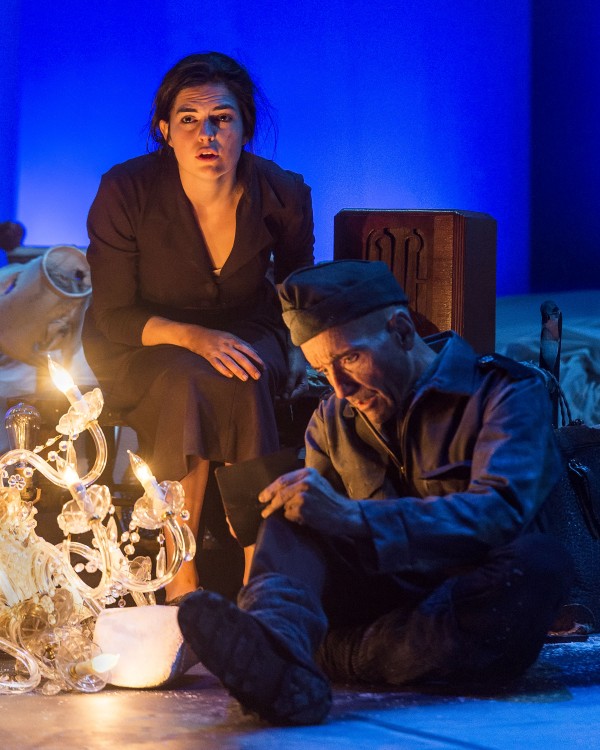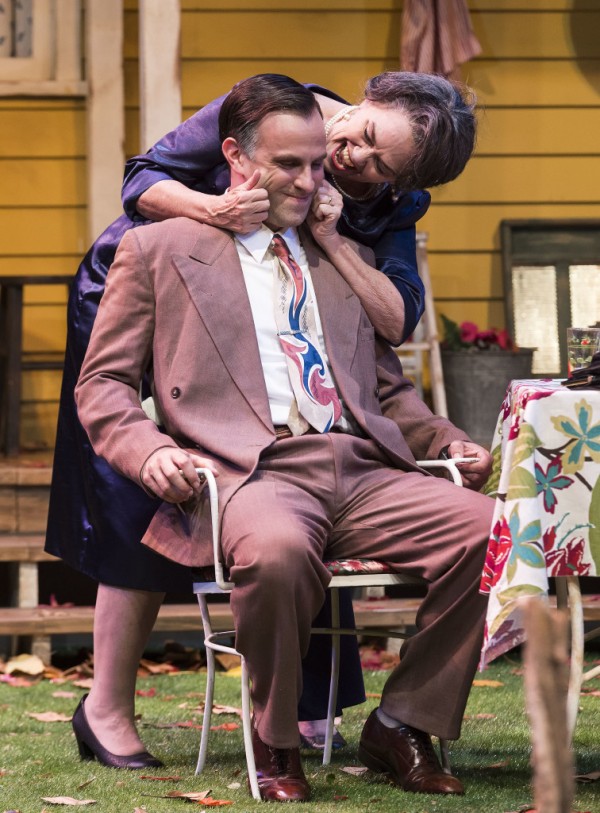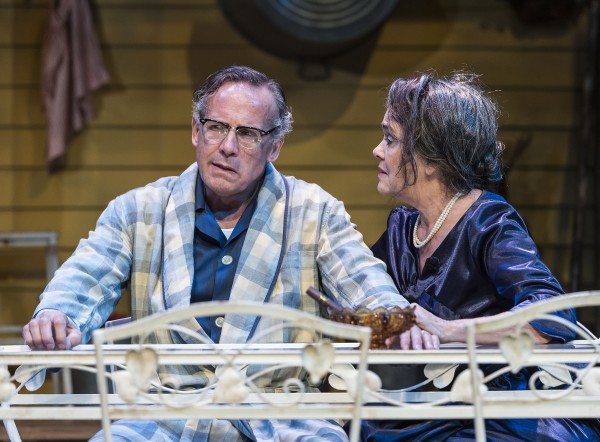In my late teens, when my interest in theatre was first aroused, Jean Anouilh was my favorite playwright. I loved the humor and romanticism of his comedies and the romanticism and sentimentality of his tragedies.
What can I say? I was a teenager; that’s what teenagers do. His plays still line my bookshelves.
For a while in the 1940s and 50s, Anouilh was all the rage. There’s no question that he left a substantial theatrical legacy very much of its time. As I re-read some of his work, it still expresses valuable emotions, things that needed to be said. But it also saddens me to note that, at this distance, the theatrical conventions of his day seem rigid and restrictive.
We have moved on. The plays no longer deliver as they once did. And this applies not only to Anouilh, but also to the work of many of his contemporaries: Cocteau, Camus, Giraudoux, Sartre, but above all Anouilh who was the most evasive and prolific of them all. When we see their work on stage today, it is in looser adaptations or translations that take wide liberties. They must if they are to speak to new generations and our own evolved sensibilities.
Robertson Dean has done a vibrant, if perhaps too faithful, job of translating Anouilh’s version of the Antigone myth for A Noise Within. When Antigone’s two brothers, Eteocles and Polynices, fought and killed one another over the terms of their succession to the throne of Thebes, Creon, who inherited that empty seat, decides to bury Eteocles and leave Polynices to rot in the sun. Defying Creon, Antigone feels compelled to bury Polynices herself, a decision that forces Creon to sentence her to death.

Doing double duty as the play’s director, Dean has mounted a worthy production. But that word “worthy” is a killer. No one wants worthy. Everyone wants exciting, thrilling, overwhelming, earth-shaking. Dean, however, remains too respectful of the playwright’s original design.
The earth does shake some in this Antigone, and its protagonist is in the hands of a capable young performer by the name of Emily James, who has the right kind of fire in her belly. But what soon becomes apparent is that the playwright has put too much nobility in everybody’s mouth and not enough plain communication. Many of the exchanges border on the declamatory — a very French thing. With the exception of Lorna Raver’s old nurse and Stephen Weingartner’s pragmatic guard, statements made by the actors in this play yearn to become pronouncements. This was the playwright’s tendency and the translator’s missed opportunity.
French plays of this period are very talky. Words trump action. Anouilh allegedly wrote Antigone as a veiled indictment of the Vichy government and Marshal Pétain (Creon). And yet Creon, especially in Eric Curtis Johnson’s powerful and anguished performance, is one of the play’s most persuasive characters. He makes a strong case for his actions, while a modern psychiatrist probably would determine that Antigone has a death wish that has little to do with her brother and more with her own yearning for martyrdom. Who wins the argument is moot.
If the play was intended as an attack on Vichy, it was an opaque one because it had to be. Anouilh in life also was opaque — slippery, private and unwilling to declare for one side or another. His plays as a whole indicate that he saw moral compromise as the enemy, and yet his own actions remained ambiguous. It was a pattern that lasted to the day he died.
Adding a level of timelessness to this Antigone, the play is set in 1943, at the height of the Nazi occupation of France in World War II, but Dean has left enough relics of ancient Greece on Frederica Nascimento’s set to neutralize the period, and muffled strains of Edith Piaf now and then accompany the action. (Is the muffling intentional? Hard to say. Only sound designer/composer Martin Carrillo has the answer.)
The costumes by Jenny Foldenauer suggest the1940s, while Jean-Yves Tessier’s lighting careens between the semi-darkness of dawn to the brightness of day, at other times giving in to a crepuscular dmness that can become irritating. A chandelier that magically still lights up while sitting on the floor shines annoyingly right into the eyes of the audience. If there is a point to all that, it remains a mystery.

Arthur Miller’s All My Sons, written, as was Antigone, in the 1940s, is the third production to open in A Noise Within’s 2015-2016 season. (Their delicious staging of the David Ives translation of Feydeau’s A Flea In Her Ear was the first; all three plays continue to run in rotating repertory.)
Aside from its time in history, All My Sons has other connections to Antigone. Both plays have events involving sons or brothers and willful women at their center. Moral action (or inaction) is at the heart of each. With Antigone it’s the need to bury a brother; in All My Sons it’s the urgency to acknowledge guilt in the death of a son by a craven father’s denial of his role in it (and much more). Both plays are afflicted by war. Both plays now also creak a little in terms of structure and form.
Directed by Geoff Elliott (who also plays Joe Keller), this All My Sons is marred by uneven casting and a decision to use actors in nontraditional roles (not necessarily wrong, but wrong for the period and locale of the play). Romantic relationships don’t spark enough fireworks and Miller’s early writing shares the blame for injecting more characters in the Kellers’ back yard than needed or wanted.
As with Antigone, these flaws only underscore the fact that theatre is a delicate plant, attached to its own time and place. It is possible to stage these aging modern classics in a relevant way (e.g. the Antaeus staging of Picnic and the Odyssey’s current Awake & Sing), but they require tremendous authenticity and great care to avoid easy pitfalls. All My Sons still retains its place as one of Miller’s significant pieces, but to present it within the context of its time, it’s essential to pay greater attention to how best to minimize the overwriting and maximize relationships.
There is no arguing with Deborah Strang’s performance as the semi-hysterical Kate Keller, who knows the truth of her husband’s deceit when he shifted blame on his partner for the defective cylinder heads that caused men to die in combat. Hers is as stark a performance as that of any tragic queen driven half mad by unacknowledged truth. And there is no arguing with Geoff Elliott’s Joe Keller, the shallow back-slapping owner of that factory, who strikes all the irritatingly jovial notes to cover up the persistent thorn of guilt he won’t admit.
That thorn can only wither from exposure, and that comes in a moment of accidental frankness with George Deever, son of the partner who took the fall (Aaron Blakely in a bristling performance). Once the lie begins to unravel there is no stopping it until the expiation is complete.

If all the performances were as powerful as these, the production might have delivered on its promise. There is, however, too much weakness and too little chemistry in the company — not enough to drive the necessary mounting tensions. That only reveals the cracks in the writing that a more cohesive staging might better have covered up.
Everywhere the evidence of good intentions is manifest, but just as present is the feeling that the times — our times, for better or worse — are more exigent. Nothing stands still. Audiences, too, have moved on, from satisfaction with the well-made play that only requires watchful contemplation, to the excitement of stage events that demand the more challenging participation of alertness, mind and heart.

Top image: l-r, Emily James as Antigone and Kyla Garcia as Ismene in Jean Anouilh’s Antigone.
All photos by Craig Schwartz.
WHAT: Antigone and All My Sons
WHERE: A Noise Within, 3352 East Foothill Blvd., Pasadena, CA 91107.
WHEN: Various times. Call 626-356-3100 ext.1 for schedule.
HOW: Tickets $44, Student Rush w/ID an hour before performance $20.
Groups (10+) start at $30 per; student groups start at $18 per. Available online at www.anoisewithin.org or at 626-356-3100 ext.1 or at the theatre box-office.
